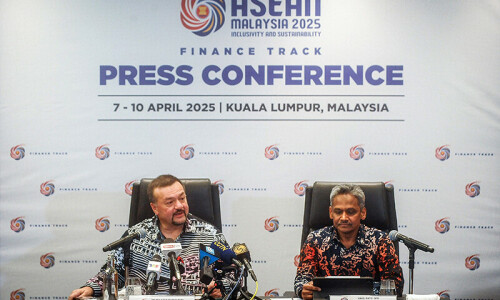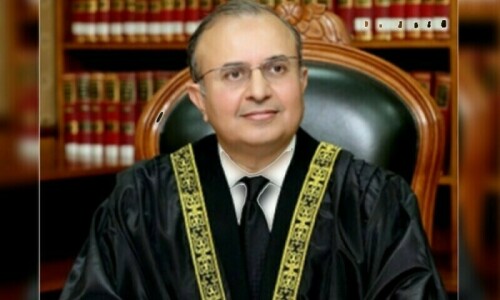The debate regarding the powers of the Rangers in relation to the Karachi operation is clearly partisan. On the one hand, the Sindh government alleges that the Rangers are acting in excess of their powers and on the other, the Rangers, or their supporters, say that the paramilitary force is acting within its powers and the law is being misused by the Sindh government to protect crime, terrorism and corruption.
Despite the partisan nature of this debate, what both camps have in common is that the conflict has come to be defined as a primarily legal one. Therefore, the legalisation of this conflict has caused this debate to focus on the legal consequences of the recent Sindh Assembly resolution, under Article 147 of the Constitution, restricting the powers of the Rangers.
But what if the roots of this conflict do not lie in any legal confusion or the misuse of powers, and instead are embedded in deeper structural contradictions?
What if the roots of the Rangers-Sindh conflict do not lie in any legal confusion or the misuse of powers?
Legal debate
The legal position regarding the power relationship between the Sindh government and Rangers is relatively clear.
The Pakistan Rangers Ordinance, 1959: This law constituted the force called the Pakistan Rangers. Its primary purpose is the protection and maintenance of order in the border areas but the Rangers can also be called upon to reinforce the police for law-and-order purposes. The current anti-terrorism operations in Karachi by the Rangers are not in exercise of the powers under this ordinance but rather of those under the Anti-Terrorism Act, 1997 (ATA).
Section 4, Anti-Terrorism Act, 1997: For the purposes of combating terrorism, the provincial (in this case the Sindh) government has the power to deploy the Rangers but with one important condition — the consent of the federal government is needed. It follows that any conditions or restrictions imposed on the powers of the Rangers must also have the consent of the federal government. In short, when the Sindh government posts Rangers for anti-terrorism operations, with the initial consent of the federal government, the Rangers conduct operations under the control of the Sindh government and not under that of the federal government.
Section 6(2), Protection of Pakistan Act, 2014: This law merely refers to, and reinforces, the power of the provincial government as given under Section 4 of the ATA.
Article 147 of the Constitution: This provision allows the provincial government to give/transfer, conditionally or unconditionally, to the federal government, or its officers, any provincial executive functions (eg policing), subject to two conditions. Firstly, the federal government has to consent to such transfer, and, secondly, such transfer has to be approved by the provincial assembly within 60 days. Therefore, it should be obvious that this article does not apply to the posting of Rangers under Section 4 of the ATA, simply because this deployment by the Sindh government (with the centre’s consent) does not in any way involve the transfer of executive provincial functions to the federal government because the Sindh government continues to control the Rangers’ actions under Section 4 of the ATA.
Three conclusions follow from this. Firstly, the actions of the Rangers come under the control of the Sindh government. Secondly, any restriction or condition imposed on the powers of the Rangers has to be with the consent of the federal government. Thirdly, the Sindh Assembly’s resolution passed on Dec 16, restricting the powers of the Rangers is at best a constitutional absurdity and at worst an unconstitutional act.
Legal versus real power
Since Musharraf’s departure, the military elite has being thinking about two structural trends which weaken its power ie democratisation and decentralisation. In the absence of the realistic possibility of a successful military coup, the military has moved from a position of ‘domination’ to ‘primacy’, which means that it claims the right to have a say, and the right of first refusal, over all important matters. In short, a militarised democracy has emerged, in which the political and military elites consensually treat each other as co-equal decision-makers, even though the military has a subordinate constitutional role.
Moreover, the military is centralised but after the 18th Amendment, the Pakistani state has become decentralised. To counter the latter, alternative centralisation structures like the apex committee, and increasing power of corps commanders are taking root in all provinces except Punjab. In short, simultaneous paradoxical processes of decentralisation and centralisation have been initiated.
The conflict over the Rangers’ powers is a result of this contradiction. In other words, the persistent contradiction between the legal power of a corrupt and incompetent but democratic Sindh political elite and the de facto, real power of an unaccountable military elite, but one which is playing an effective role in fighting terror in Sindh.
Consequences of militarised internal security
What happens when fighting terror is made the only achievable political goal by the political elite? What happens when the civilian and military elites can offer nothing in economic, political and social reform to the people except ensuring the bare necessities of physical security? What happens when the monopoly to fight terror is handed over to the military leading to the militarisation of internal security? The consequences are obvious — a political government which has the primary constitutional responsibility of providing security but which is completely dependent on the military elite for internal security.
The conflict over the Rangers’ powers is also the result of the above contradiction — in other words, a developing contradiction between the civilianisation and dominance of the politics of internal security and the militarisation of the practice of internal security.
The bad news is that these contradictions will continue to be translated into conflict. The good news is that this may not lead to a political breakdown as long as there appears to be a perception of a balance of power between the political and military elites, as during Imran Khan’s dharna. Therefore, the civil-military relationship appears as a successful but unstable marriage, where both husband and wife constantly threaten each other but still remain married.
The writer is a lawyer.
Published in Dawn, December 19th, 2015













































